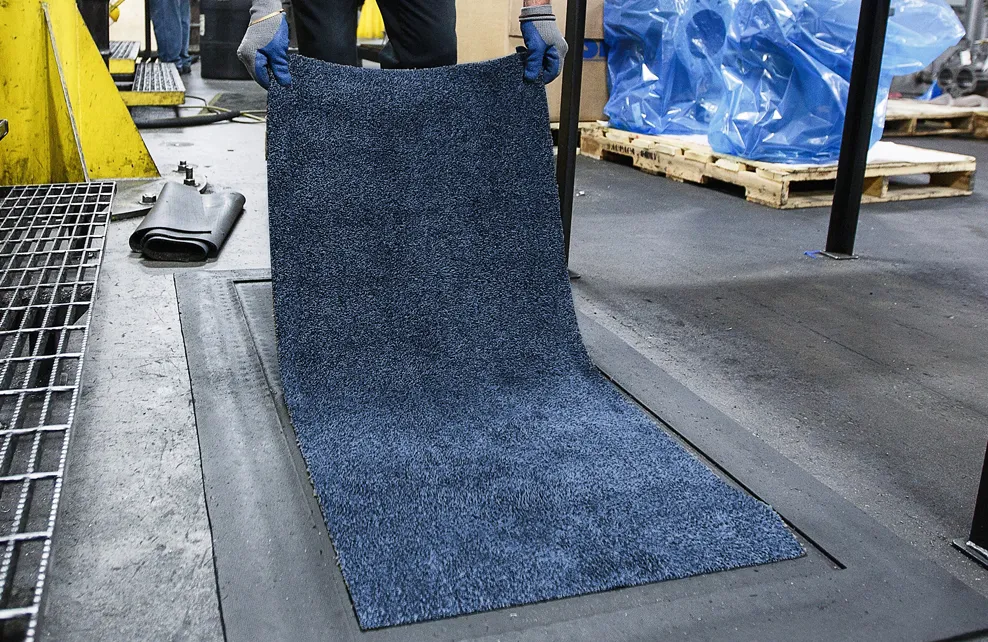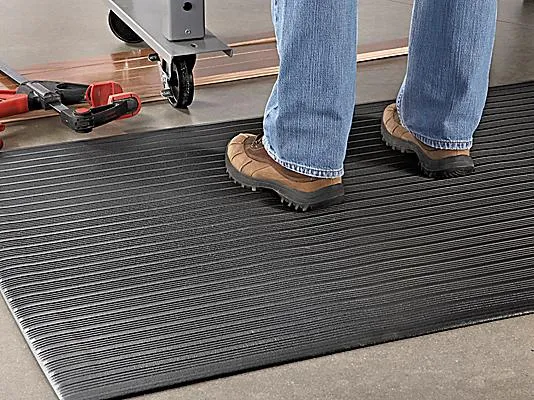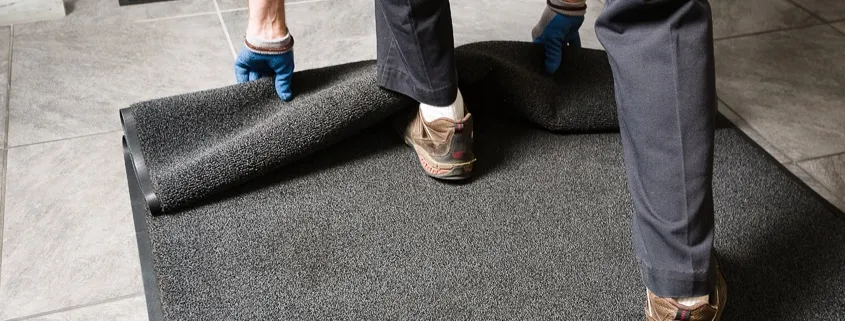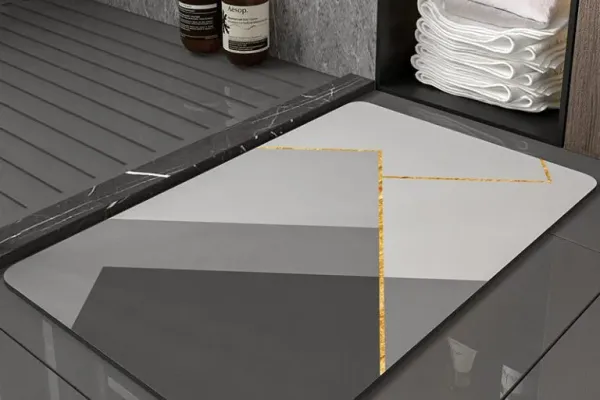Understanding Industrial Anti-Fatigue Mats: A Guide to Enhancing Safety and Comfort
In industrial environments, where workers are often on their feet for extended periods, enhancing safety and comfort is vital. تشک های ضد خستگی play a crucial role in achieving this balance by offering support and reducing fatigue. This guide delves into the world of durable mats suitable for industrial use, focusing on how they improve workplace conditions and contribute to employee well-being.

فهرست مطالب
Why Are Anti-Fatigue Mats Important in Industrial Settings?
تشک های ضد خستگی are designed to provide cushioning and support, substantially enhancing the work environment in industrial settings by reducing physical strain on workers.
Key Benefits
- Reduce Fatigue: By encouraging subtle movements of leg muscles that improve blood flow, these mats significantly کاهش خستگی and discomfort resulting from prolonged standing.
- Enhance Safety: These mats also contribute to workplace safety by offering a non-slip surface, which can prevent accidents in high-traffic areas.
In industries where standing tasks are prevalent, incorporating anti-fatigue solutions is indispensable for maintaining productivity and ensuring worker health.
What Different Types of Industrial Floor Mats Are Available?
Industrial mats come in various types, each tailored to specific needs within industrial settings to ensure functionality and durability.
Types of Mats
- تشک لاستیکی: Known for their resilience against industrial chemicals and harsh conditions.
- تشک ضد خستگی: Specifically designed to enhance comfort by reducing strain from standing on hard floors.
- Drainage Mats: Often used in wet areas to allow liquid escape, preventing slip hazards.
Choosing the right type depends on the particular functions needed in industrial and commercial environments, balancing comfort with practical needs.
How Do Anti-Fatigue Mats Improve Workplace Safety and Comfort?
تشک های ضد خستگی are manufactured to boost safety and comfort, directly impacting employee performance and well-being.
Improvements
- Safety and Comfort: The unique design of these mats enhances traction and cushioning, ensuring that workers operate safely and comfortably.
- مواد بادوام: Constructed from materials that withstand heavy use, these mats provide long-lasting protection to industrial floors.
By integrating anti-fatigue solutions, businesses can significantly reduce workplace hazards and foster a supportive work atmosphere.
What Materials Are Used in Industrial Anti-Fatigue Mats?
The choice of materials in industrial anti-fatigue mats affects their durability, performance, and suitability for specific environments.
مواد رایج
- لاستیک: Offers excellent durability and resistance to oils and chemicals, suitable for heavy-duty use.
- Foam Blends: Used for added cushioning and impact absorption, ensuring extended comfort.
Studying material properties ensures that mats are designed to meet the diverse and demanding needs of industrial settings.
Where Should Anti-Fatigue Mats Be Placed?
Strategic placement of تشک های ضد خستگی can maximize their benefits throughout various workplace areas.
Ideal Locations
- Workstations and Assembly Lines: Where employees stand for significant durations requiring continuous comfort and support.
- Entrance Floor Mats: To ensure clean, slip-free entries, capturing dirt and moisture.
Placing these mats in key areas contributes to overall safety and minimizes physical strain on workers.

Can Anti-Fatigue Mats Help in Wet Areas?
بله، anti-fatigue floor mats طراحی شده برای wet areas are excellent for water-prone environments, offering both comfort and slip resistance.
Wet Area Advantages
- مقاومت در برابر آب: Perfectly suited for settings like kitchens and industrial processing areas where liquids frequently spill.
- چسبندگی پیشرفته: Constructed to provide additional traction, helping prevent slips and falls in hazardous locations.
By addressing specific challenges of wet environments, these mats serve a dual purpose of safety and comfort.
What Role Does Drainage Play in Industrial Mats?
Drainage mats incorporate essential features for maintaining a safe and clean industrial environment where spillages are common.
Functionality and Design
- Efficient Liquid Management: These mats are perforated to allow liquids to pass through, keeping the top surface dry.
- Non-Slip Surface: Provides traction and reduces risks of slipping, even when wet.
Designed for practicality, drainage mats are crucial elements in industries requiring effective liquid management solutions.
How to Choose the Right Industrial Floor Mat for Your Needs?
Selecting an appropriate industrial floor mat requires considering specific requirements, ensuring compatibility with the intended environment.
Selection Criteria
- Size and Coverage: Ensure mats cover the necessary areas without impeding mobility or operations.
- Material and Durability: Choose materials that correspond to environmental demands, such as resistance to chemicals or abrasion.
- ویژگی های ایمنی: Consider mats with built-in safety features, like yellow safety borders or slip-resistant textures.
Through careful consideration of these factors, mats can be tailored to meet specific workplace needs, enhancing both safety and functionality.
Are There Custom Options for Industrial Floor Mats?
سفارشی کردن industrial floor mats allows businesses to address unique requirements and expand the versatility of their flooring solutions.
گزینه های سفارشی سازی
- اندازه و شکل: Create custom configurations that perfectly fit awkward or expansive areas.
- Branding and Design: Add company logos or custom patterns, enriching aesthetics and enhancing brand presence.
Leveraging custom options ensures that your floor mats align perfectly with operational and visual requirements.
How to Maintain Industrial Floor Mats for Longevity?
Proper maintenance of industrial floor mats ensures continuous performance, longevity, and appearance, crucial for demanding work environments.
نکات تعمیر و نگهداری
- نظافت منظم: Routine vacuuming and cleaning prevent dirt accumulation, ensuring mats maintain grip and effectiveness.
- Material-Specific Care: Follow proper care methods for specific materials, such as rubber or foam, to prolong life and performance.
Regular maintenance enhances the life expectancy of floor mats, optimizing safety and minimizing replacement costs.

Summary: Essential Points
- Comfort and Safety: Anti-fatigue floor mats improve worker wellbeing by reducing fatigue and enhancing safety.
- مسائل مادی: Rubber and foam blends offer durability and cushioning necessary for industrial use.
- Strategic Placement: Place mats in key areas to optimize comfort and operational efficiency.
- Drainage and Wet Use: Specialized mats address challenges in fluid-prone environments, offering both slip resistance and comfort.
- گزینه های سفارشی: Tailor mats to meet specific size, shape, and design needs for greater functional and aesthetic integration.
- تعمیر و نگهداری: Routine care preserves functionality and extends the life of industrial mats.
Explore practical solutions such as the high quality anti slip PVC floor rolls for unparalleled durability and efficiency, or discover the safety features of تشک پله ای ضد لغزش to enhance workplace safety across all levels.




